
Fluids
Scope & Guideline
Inspiring breakthroughs in the science of fluids since 2016.
Introduction
Aims and Scopes
- Computational Fluid Dynamics (CFD):
The journal emphasizes the development and application of advanced computational techniques for simulating fluid flows, including but not limited to, lattice Boltzmann methods, finite volume methods, and spectral element methods. - Multiphase and Multiscale Flows:
Research on the dynamics of multiphase flows, including interactions between different fluid phases and complex boundary conditions, is a core area. This includes studies on droplet dynamics, bubble interactions, and fluid-particle interactions. - Turbulence Modeling and Analysis:
The journal publishes significant contributions to the understanding and modeling of turbulence, including large-eddy simulations (LES), direct numerical simulations (DNS), and Reynolds-averaged Navier-Stokes (RANS) approaches. - Fluid-Structure Interaction (FSI):
Research addressing the interaction between fluid flows and deformable structures is a consistent focus, encompassing methodologies that enhance the understanding of FSI in various engineering applications. - Machine Learning and Data-Driven Approaches:
There is a notable interest in integrating machine learning techniques with fluid dynamics, emphasizing data-driven modeling, uncertainty quantification, and optimization in fluid simulations. - Physics-Informed Neural Networks (PINNs):
The journal has recently highlighted the use of PINNs to solve complex fluid dynamics problems, indicating a trend towards innovative computational methodologies that leverage neural networks.
Trending and Emerging
- Advanced Machine Learning Applications:
The rise of publications incorporating machine learning techniques into fluid dynamics research demonstrates a trend towards leveraging AI for predictive modeling, uncertainty quantification, and optimization. - Quantum Computing in Fluid Dynamics:
The exploration of quantum algorithms for fluid simulation marks an innovative direction in the field, indicating a growing interest in harnessing quantum computing for solving complex fluid dynamics problems. - High-Performance Computing (HPC) Techniques:
There is an increasing emphasis on developing and utilizing HPC frameworks for fluid simulations, reflecting the need for efficient computational resources to handle complex and large-scale fluid dynamics problems. - Multiscale Modeling Approaches:
Emerging research trends are focusing on multiscale models that bridge different scales of fluid dynamics, particularly in applications such as biological systems and material sciences. - Integration of Fluid Dynamics with Other Disciplines:
The journal is increasingly publishing interdisciplinary research that integrates fluid dynamics with fields such as biology, materials science, and environmental science, reflecting a broader application of fluid dynamics principles.
Declining or Waning
- Traditional Analytical Techniques:
There is a noticeable decrease in the publication of papers focusing solely on traditional analytical methods for fluid dynamics, as researchers increasingly turn to numerical simulations and machine learning techniques. - Simplistic Models of Fluid Dynamics:
Studies that utilize overly simplistic models or assumptions in fluid dynamics are becoming less frequent, likely due to a growing recognition of the need for more sophisticated approaches that capture the complexities of real-world flows. - Experimental Fluid Dynamics:
Although experimental studies are still relevant, there appears to be a decline in the number of experimental papers published, possibly as a result of the increasing capabilities and preferences for computational simulations over physical experiments.
Similar Journals

Magnetohydrodynamics
Navigating the Frontiers of Theoretical and Applied PhysicsMagnetohydrodynamics, published by the University of Latvia Institute of Physics, stands as a crucial repository of knowledge within the realms of Electrical and Electronic Engineering and Physics and Astronomy. With its roots extending back to 1970, this journal offers an extensive archive of scholarly articles focusing on the dynamics of electrically conducting fluids, an area of increasing relevance in both theoretical and applied physics. Although the journal currently does not operate under an open-access model, it provides valuable insights that continue to impact ongoing research and technological advancements in magnetohydrodynamic applications. Its prestigious standing is reflected in its Q3 category rankings within both specified fields and its significant position within the Scopus rankings, marking its importance for professionals and researchers alike. As the journal reaches the convergence years culminating in 2024, readers can expect a rich anthology of pioneering studies and developments that bridge the gap between fundamental research and its practical implications.
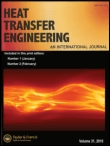
HEAT TRANSFER ENGINEERING
Exploring the frontiers of heat transfer and engineering excellence.HEAT TRANSFER ENGINEERING is a leading international journal published by Taylor & Francis Inc, dedicated to advancing the field of heat transfer and thermal engineering. With a strong focus on the key aspects of Condensed Matter Physics, Fluid Flow and Transfer Processes, and Mechanical Engineering, this journal covers a comprehensive range of topics from experimental studies to theoretical analysis, aiming to foster innovative research and practical applications. Since its inception in 1979 and continuing through 2024, the journal has established itself as an essential resource for researchers and industry professionals alike, reflected in its solid rankings within Scopus—holding a Q2 quartile classification in multiple engineering disciplines. Although not open access, the journal ensures broad accessibility through institutional subscriptions, making cutting-edge research readily available. With its rigorous peer-review process and commitment to quality, HEAT TRANSFER ENGINEERING plays a crucial role in shaping the future of thermal management solutions and engineering practices.

FDMP-Fluid Dynamics & Materials Processing
Advancing Knowledge in Fluid Dynamics and Materials ProcessingFDMP-Fluid Dynamics & Materials Processing, published by TECH SCIENCE PRESS, stands as a significant contribution to the field of materials science, specifically focusing on the intricate relationships between fluid dynamics and material processing. With an ISSN of 1555-256X and an E-ISSN of 1555-2578, this journal offers an open-access platform where researchers can disseminate their work broadly, promoting collaboration and innovation among professionals and students alike. Established in 2007 and continuously evolving through to 2024, the journal is classified in the Q4 category of materials science, ranking at #347 out of 463 in the Scopus database, signifying its niche yet crucial role in the academic community. By focusing on the dynamic interplay between fluid behavior and material properties, FDMP addresses contemporary challenges and advances in material processing techniques. The journal plays a pivotal role for academics and industry professionals seeking to push the boundaries of knowledge and application in materials science.

Physical Review Fluids
Advancing Knowledge in Fluid MechanicsPhysical Review Fluids is an esteemed journal published by the American Physical Society, focusing on the intricate and essential field of fluid dynamics. With an impressive Q1 ranking in categories such as Computational Mechanics, Fluid Flow and Transfer Processes, and Modeling and Simulation, this journal serves as a pivotal resource for researchers and professionals seeking to disseminate high-quality and innovative research findings. The journal's scope encompasses a broad spectrum of topics within fluid mechanics, promoting advancements in theoretical, computational, and experimental methodologies. Although it is not an open-access journal, its publications are critically well-received, underpinned by its strong standing in the Scopus rankings which place it in the top percentiles across various relevant fields. Physical Review Fluids has been a foundational platform for scholars to share their discoveries from 2016 through 2024, making it an indispensable asset in the ongoing evolution of fluid dynamics research.

INTERNATIONAL JOURNAL OF HEAT AND FLUID FLOW
Exploring Innovations in Thermal and Fluid SystemsFounded in 1979, the INTERNATIONAL JOURNAL OF HEAT AND FLUID FLOW is a premier publication in the fields of mechanical engineering, fluid dynamics, and heat transfer, published by Elsevier Science Inc. With an impressive impact factor and ranking in the Q1 category for Mechanical Engineering and Q2 for Condensed Matter Physics and Fluid Flow and Transfer Processes, this journal is highly regarded for its rigorous peer-reviewed articles that contribute significantly to the advancement of knowledge in these critical areas. Researchers, professionals, and students can access cutting-edge studies that explore the intricacies of thermal and fluid systems, ensuring they stay at the forefront of scientific exploration. The Scopus rankings further affirm its role as a leading source of impactful research, with significant placements in crucial academic categories. Join an active community of scholars committed to innovation and excellence in the exploration of heat and fluid flow phenomena.
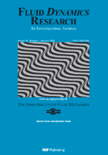
FLUID DYNAMICS RESEARCH
Exploring Interdisciplinary Insights in Fluid FlowFLUID DYNAMICS RESEARCH, published by IOP Publishing Ltd, is a pivotal journal dedicated to advancing the understanding of fluid dynamics through interdisciplinary research that spans several domains including mechanical engineering and physics. With an ISSN of 0169-5983 and E-ISSN 1873-7005, this journal provides a vital platform for researchers aiming to disseminate new findings and theoretical advancements in fluid flow and transfer processes. As of 2023, FLUID DYNAMICS RESEARCH holds a commendable position within the academic community, ranked Q3 in fluid flow and transfer processes, mechanical engineering, and miscellaneous physics and astronomy categories. The journal showcases a diverse array of articles that not only inspire collaboration among professionals and students but also ensure that theoretical and experimental studies are accessible for further development in the field. Operating from the United Kingdom, the journal offers a unique opportunity for scholars worldwide to contribute to the vibrant community dedicated to understanding the complexities of fluid dynamics, even as it anticipates converging its years of research from 1986 to 2024.
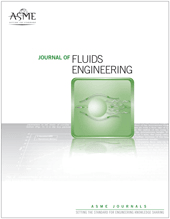
JOURNAL OF FLUIDS ENGINEERING-TRANSACTIONS OF THE ASME
Elevating Standards in Fluids Engineering ScholarshipJOURNAL OF FLUIDS ENGINEERING-TRANSACTIONS OF THE ASME, published by the renowned American Society of Mechanical Engineers (ASME), stands as a pivotal platform for disseminating cutting-edge research in the field of mechanical engineering, specifically focusing on fluid mechanics and its diverse applications. With an established history dating back to 1897, this journal features research that pushes the boundaries of knowledge and technology in areas such as fluid dynamics, thermal engineering, and hydrodynamics. Although it is not an open-access journal, it maintains rigorous peer-review standards, ensuring the publication of high-quality scholarly articles that contribute to the academic and professional community. In the latest rankings, it holds a respectable position within the Q2 category of mechanical engineering journals, reflecting its significant impact, as evidenced by its Scopus rank of #204 out of 672, placing it in the 69th percentile. Researchers, professionals, and students alike will find this journal to be a vital resource for the latest developments and innovative insights in fluids engineering.
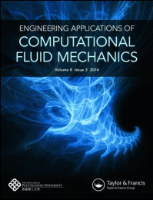
Engineering Applications of Computational Fluid Mechanics
Leading the Charge in Computational Fluid InnovationsEngineering Applications of Computational Fluid Mechanics is an esteemed journal published by Taylor & Francis Ltd that serves as a vital resource for researchers, professionals, and students in the field of fluid mechanics and its computational applications. With an ISSN of 1994-2060 and an E-ISSN of 1997-003X, this journal has established its reputation through its rigorous peer-review process and commitment to Open Access since 2015, facilitating widespread dissemination of cutting-edge research. Based in the United Kingdom, the journal is indexed in leading databases and has achieved a significant impact in its categories, ranking in the top quartile (Q1) for both Computer Science (miscellaneous) and Modeling and Simulation as of 2023. Notably, its Scopus rankings place it in the top 4% of Mathematics/modeling and simulation, highlighting its importance in advancing knowledge and innovation within the discipline. The journal invites contributions that explore both theoretical and practical aspects of computational fluid dynamics, fostering collaboration and intellectual growth within the community.

International Journal of Fluid Mechanics Research
Championing High-Impact Research in Fluid MechanicsThe International Journal of Fluid Mechanics Research, published by BEGELL HOUSE INC, is a pivotal platform for the dissemination of innovative research within the fields of Mechanical Engineering and Physics. With a focus on the intricate dynamics of fluid behavior, this journal has been a cornerstone of scholarly communication since its inception in 1996, continuing to engage a global audience of researchers and professionals through to 2024. With a respectable Impact Factor reflecting its significant contributions to the disciplines—ranking in Q3 for both Mechanical Engineering and Miscellaneous Physics and Astronomy categories—this journal presents a unique opportunity for authors to share their findings in a peer-reviewed environment. Although it does not currently offer Open Access options, all published articles are carefully curated, ensuring high-quality research is accessible to its readership. As the journal navigates the complexities of fluid mechanics, it fosters an interdisciplinary dialogue, bridging theoretical frameworks with practical applications, thereby enhancing understanding and innovation in related fields.
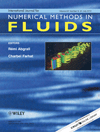
INTERNATIONAL JOURNAL FOR NUMERICAL METHODS IN FLUIDS
Exploring the Depths of Computational Fluid DynamicsINTERNATIONAL JOURNAL FOR NUMERICAL METHODS IN FLUIDS, published by Wiley, has established itself as a leading platform for cutting-edge research in the fields of applied mathematics, computational mechanics, computer science applications, and mechanical engineering. With its ISSN 0271-2091 and E-ISSN 1097-0363, this journal is committed to disseminating high-quality, peer-reviewed articles that contribute to the advancement of numerical methodologies in fluid dynamics. Boasting a commendable 2023 impact factor that places it in the second quartile across multiple relevant categories, it provides insights into significant research dimensions that engage an audience of researchers, professionals, and students keen on the computational challenges of fluid flow. The journal's broad scope encompasses foundational and applied research, encouraging the exploration of new numerical techniques and algorithms. As an invaluable resource based in the United Kingdom, INTERNATIONAL JOURNAL FOR NUMERICAL METHODS IN FLUIDS remains dedicated to providing insights and fostering innovation in its domain, with a consistent publication history spanning from 1981 to 2024.